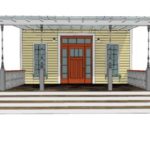When U.S. Army vet Steve Smith returned to Dallas in 2007 from his second tour of duty in the Middle East, his food allergies were so severe that he needed to address them head on. “It inspired me to do some research into food and organics,” said Smith, who traces his lactose intolerance to Army vaccinations. Soon, Smith began planting vegetables around his home. “Basically, I tore up my yard.”
Around the same time, he also reconnected with James Jeffers, an Army friend from their days at nearby Fort Hood, and a fellow Iraq war veteran. Jeffers had left the Army after a diagnosis of traumatic brain injury. “He was trying to figure out what he wanted to do,” Smith said. After Jeffers caught Smith’s gardening bug, they began planting veggies, greens, and herbs anywhere people would let them. “We did my yard, we did his yard, we did a community garden, we did a neighbor’s yard, then we did a rooftop,” Smith said. “Soon, we had nine properties. I was growing for my family, then we were growing for the community, then we were taking excess and selling it to restaurants. We saw a model.”
By 2012, the pair had incorporated their business as Eat the Yard, and were selling produce to a handful of Dallas restaurants and groceries, as well as the Dallas Farmers Market. Meanwhile, as they grew Eat the Yard, Smith and Jeffers noticed that some of their military buddies were hitting bottom while trying to readjust to civilian life. During a three-year span, 10 friends committed suicide. “We’re sitting back going, ‘Why didn’t the VA do anything? Why didn’t the government do anything?’” Smith said. “We realized we could do something about it” — using what he calls “dirt therapy.” By hiring vets to grow food, the two thought they could provide them with not just income but meaningful work.
“When you join the military, you do it because you want to give back to the community, because you’re up to the challenge, because you’re not afraid of hard work,” Smith said. “That’s kind of the perfect match for farming. We think that these vets that are coming back, that can’t be in the military anymore — they might find a job that’s at least as rewarding.”
Last year, Smith and Jeffers incorporated a 501(c)(3) called Farmers Assisting Returning Military (FARM). At their 17-acre farm in DeSoto, Texas, a handful of vets live and farm. “Some of them come to us out of desperation; some might leave in two months,” Smith said. FARM also hosts trauma-resolution and self-leadership workshops, as well as provides plenty of work. “We’ve got more demand than we have supply,” Smith said. “We don’t have enough bodies to grow the food.”
This year, Jeffers and Smith hope to “ramp up” their egg production, convert a parking lot in downtown Dallas into a greenhouse and teaching garden, and expand their therapeutic programs. As with many nonprofits, adequate funding is a challenge — but one worth mastering. “At the end of the day,” Smith said, “[the vets] can do something that makes them feel good about themselves, makes them feel like they have self worth, and makes them feel that the best thing they did in their entire lives wasn’t just fighting for the country, but also feeding the country.”




